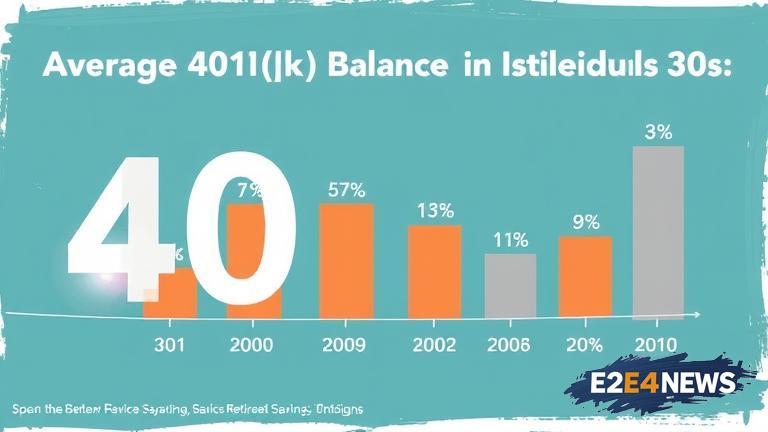When it comes to retirement savings, it’s essential to start early and consistently contribute to a 401(k) or other retirement accounts. According to recent data, the average 401(k) balance for individuals in their 30s is around $43,600. This amount may seem modest, but it’s a significant step towards securing a comfortable retirement. To put this number into perspective, consider that the average 401(k) balance for all ages is approximately $106,000. However, for individuals in their 30s, the focus should be on steady growth and maximizing contributions. One key strategy is to take advantage of employer matching, which can significantly boost retirement savings over time. Additionally, individuals in their 30s should aim to contribute at least 10% to 15% of their income towards retirement. It’s also crucial to avoid common mistakes, such as withdrawing from a 401(k) too early or failing to diversify investments. By prioritizing retirement savings and making informed decisions, individuals in their 30s can set themselves up for long-term financial success. Furthermore, it’s essential to consider other sources of retirement income, such as Social Security benefits and potential pension plans. A well-rounded retirement strategy should also include a mix of low-risk and higher-risk investments, such as stocks and bonds. Moreover, individuals in their 30s should be mindful of fees associated with 401(k) accounts and aim to minimize them. Another critical aspect is to review and adjust retirement savings regularly, taking into account changes in income, expenses, and financial goals. By doing so, individuals can ensure they’re on track to meet their retirement objectives. It’s also worth noting that some employers offer Roth 401(k) options, which allow contributions to be made with after-tax dollars. This can provide tax benefits in retirement, as withdrawals are tax-free. In conclusion, while the average 401(k) balance for individuals in their 30s may seem modest, it’s a crucial step towards securing a comfortable retirement. By prioritizing retirement savings, avoiding common mistakes, and making informed decisions, individuals in their 30s can set themselves up for long-term financial success. As the years go by, consistent contributions and smart investment choices can help grow retirement savings significantly. It’s never too early to start planning for retirement, and individuals in their 30s are in a prime position to make the most of their retirement savings. With the right strategy and mindset, individuals can overcome common challenges and achieve their retirement goals. Ultimately, a secure retirement requires careful planning, discipline, and patience. By starting early and staying committed, individuals in their 30s can build a strong foundation for a comfortable and secure retirement. In addition to 401(k) accounts, individuals may also consider other retirement savings options, such as IRAs or annuities. It’s essential to weigh the pros and cons of each option and choose the one that best aligns with individual financial goals and circumstances. By doing so, individuals can create a comprehensive retirement strategy that sets them up for long-term success. Moreover, individuals in their 30s should be aware of the potential impact of market fluctuations on their retirement savings. By diversifying investments and maintaining a long-term perspective, individuals can reduce their exposure to market volatility and stay on track to meet their retirement objectives. In the end, a secure retirement requires a combination of smart planning, consistent savings, and a commitment to long-term financial success.
